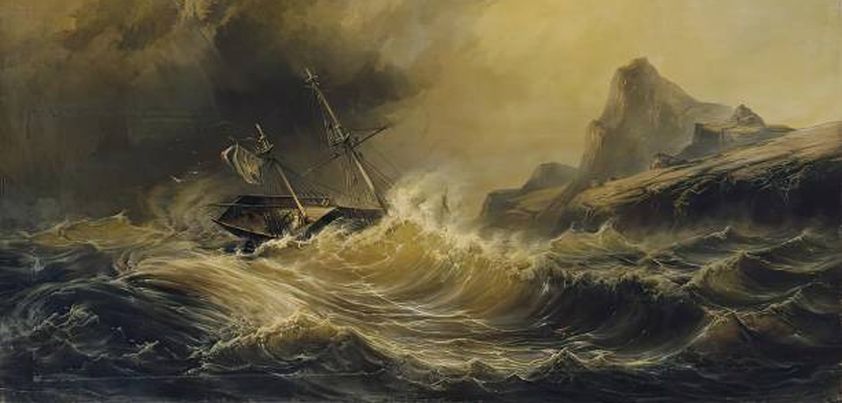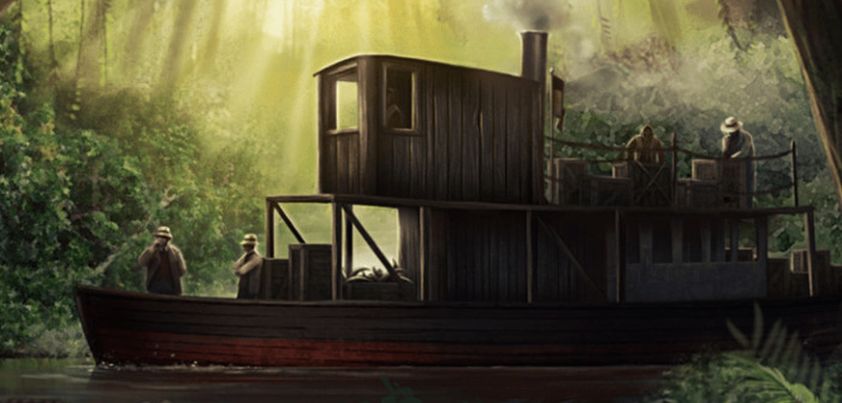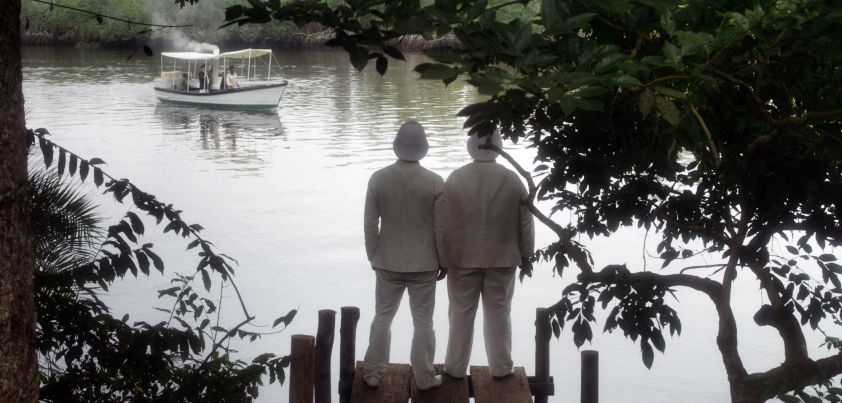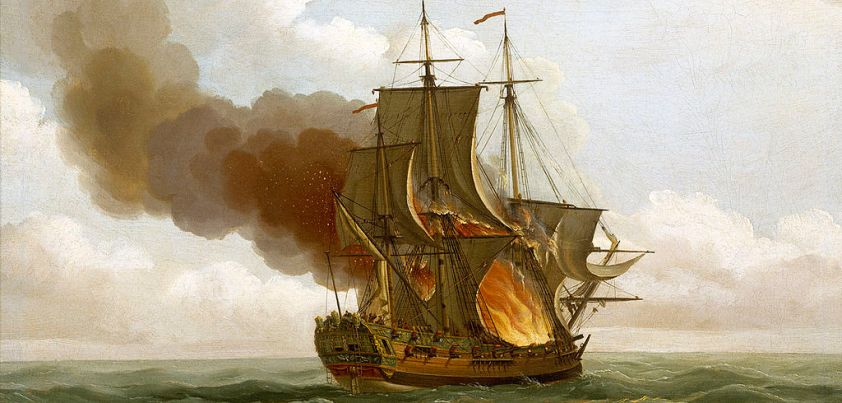 In this story by Joseph Conrad, a man tells his lover a tale about an English naval captain (who she later deduces to be him) racked with guilt over a decision made at sea. While sheltering from fog, he encountered a trading ship which he became increasingly suspicious of being a privateer supplying fuel to enemy U-boats. However, the ship’s papers were in order. With no legal basis for seizing the ship, he found a way to send it and all on board to their doom without firing a shot. Themes include duty vs. morality in war, guilt. More…
In this story by Joseph Conrad, a man tells his lover a tale about an English naval captain (who she later deduces to be him) racked with guilt over a decision made at sea. While sheltering from fog, he encountered a trading ship which he became increasingly suspicious of being a privateer supplying fuel to enemy U-boats. However, the ship’s papers were in order. With no legal basis for seizing the ship, he found a way to send it and all on board to their doom without firing a shot. Themes include duty vs. morality in war, guilt. More…
Archives
Heart of Darkness
 This story by Joseph Conrad is told through the eyes of a riverboat captain sent into the heart of Africa to contact an enigmatic trading post manager employing questionable methods. It explores the concept of Darkness on several levels. At the highest, we have the ‘darkness’ of unexplored Africa, and the ‘darkness’ of European imperialism in seeking to subjugate its peoples and exploit its resources. On a more fundamental level, we have the potential ‘darkness’ (capacity for cruelty/evil) in the heart of every man. Themes include alienation and loneliness, power, moral and mental degeneration under colonialism, racism, cruelty, greed, exploitation. More…
This story by Joseph Conrad is told through the eyes of a riverboat captain sent into the heart of Africa to contact an enigmatic trading post manager employing questionable methods. It explores the concept of Darkness on several levels. At the highest, we have the ‘darkness’ of unexplored Africa, and the ‘darkness’ of European imperialism in seeking to subjugate its peoples and exploit its resources. On a more fundamental level, we have the potential ‘darkness’ (capacity for cruelty/evil) in the heart of every man. Themes include alienation and loneliness, power, moral and mental degeneration under colonialism, racism, cruelty, greed, exploitation. More…
The Lagoon
 The major message of this acclaimed story from Joseph Conrad is that you can’t escape reality: there is no place where death is forgotten — where death is unknown. Arsat, a powerful warrior, risks all for the love of a royal slave girl. While making their escape, he abandons his devoted brother as he is being attacked by pursuers. Some time later, the woman dies of fever in their lagoon-side jungle hideaway. Experiencing remorse over both deaths, he decides that the only path to redemption is (some would say unjustified) retribution. Themes: brotherly love, romantic obsession, courage, betrayal, guilt, isolation, death. More…
The major message of this acclaimed story from Joseph Conrad is that you can’t escape reality: there is no place where death is forgotten — where death is unknown. Arsat, a powerful warrior, risks all for the love of a royal slave girl. While making their escape, he abandons his devoted brother as he is being attacked by pursuers. Some time later, the woman dies of fever in their lagoon-side jungle hideaway. Experiencing remorse over both deaths, he decides that the only path to redemption is (some would say unjustified) retribution. Themes: brotherly love, romantic obsession, courage, betrayal, guilt, isolation, death. More…
An Outpost of Progress
 Joseph Conrad’s major theme in this story is the hypocrisy of colonialism. Motivated by greed, the bumbling administrators of a remote African trading post rationalize their activities by talking about the sacredness of the civilizing work, and the merits of those who (go) about bringing light, and faith and commerce to the dark places of the earth. They denigrate the local tribesmen, but make no effort to learn their language or customs. Ironically, being cut off from civilization results in their moral, physical and mental decline to an even lower level of savagery. Themes: colonialism, greed, slavery, isolation, madness. More…
Joseph Conrad’s major theme in this story is the hypocrisy of colonialism. Motivated by greed, the bumbling administrators of a remote African trading post rationalize their activities by talking about the sacredness of the civilizing work, and the merits of those who (go) about bringing light, and faith and commerce to the dark places of the earth. They denigrate the local tribesmen, but make no effort to learn their language or customs. Ironically, being cut off from civilization results in their moral, physical and mental decline to an even lower level of savagery. Themes: colonialism, greed, slavery, isolation, madness. More…
The Secret Sharer
 The term secret sharer in this Joseph Conrad adventure could apply to both the protagonist (a young ship’s captain preparing for his first sea command) and his fugitive cabin guest. The similarities between them in terms of age, appearance and background suggest that Conrad is using the guest as a foil to highlight the captain’s strengths and weaknesses. Unlike the guest, the captain is unsure of himself and does not project the self-confidence and authority needed to gain the respect of his older, more experienced officers. Themes include leadership, isolation, identity, duality, self-awareness, self-mastery, and the power of the sea. More…
The term secret sharer in this Joseph Conrad adventure could apply to both the protagonist (a young ship’s captain preparing for his first sea command) and his fugitive cabin guest. The similarities between them in terms of age, appearance and background suggest that Conrad is using the guest as a foil to highlight the captain’s strengths and weaknesses. Unlike the guest, the captain is unsure of himself and does not project the self-confidence and authority needed to gain the respect of his older, more experienced officers. Themes include leadership, isolation, identity, duality, self-awareness, self-mastery, and the power of the sea. More…
Youth
 This story from Joseph Conrad is more than a survival tale about an unseaworthy ship beset by bad luck. Central themes are youthful exuberance bordering on recklessness, regret for its passing, and the romance of the sea. The explosion that sinks the vessel marks a turning point for a young ship’s officer. Up until then, his enthusiasm had been fueled by a youthful desire to experience the wonders of the East. He discovers a new side of himself (leadership ability) when he temporarily takes command of the crew’s evacuation to the lifeboats. Other themes: courage, duty, misfortune, survival, self-discovery, pride. More…
This story from Joseph Conrad is more than a survival tale about an unseaworthy ship beset by bad luck. Central themes are youthful exuberance bordering on recklessness, regret for its passing, and the romance of the sea. The explosion that sinks the vessel marks a turning point for a young ship’s officer. Up until then, his enthusiasm had been fueled by a youthful desire to experience the wonders of the East. He discovers a new side of himself (leadership ability) when he temporarily takes command of the crew’s evacuation to the lifeboats. Other themes: courage, duty, misfortune, survival, self-discovery, pride. More…